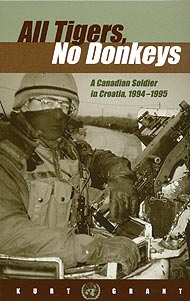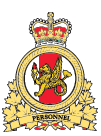 This information has been archived for reference or research purposes.
This information has been archived for reference or research purposes.
Archived Content
Information identified as archived on the Web is for reference, research or recordkeeping purposes. It has not been altered or updated after the date of archiving. Web pages that are archived on the Web are not subject to the Government of Canada Web Standards. As per the Communications Policy of the Government of Canada, you can request alternate formats on the "Contact Us" page.
Book Reviews
All Tigers, No Donkeys
A Canadian Soldier in Croatia,
1994-1995
by Kurt Grant
St. Catharines, Ontario: Vanwell Publishing Ltd., 2004 319 pages, Paperback: $29.95
Reviewed by Lieutenant-Colonel (ret’d) E.P. Luhtala
For more information on accessing this file, please visit our help page.
 All Tigers No Donkeys is a diary account of reservist Kurt Grant’s tour of duty with 1st Battalion Royal Canadian Regiment (1RCR), “Dukes Company,” when they served in Croatia as part of United Nations Protection Force (UNPROFOR) Rotation 5 during 1994 and1995. His motivation for keeping the diary was two-fold; firstly, to provide an emotional release or a means to document his thoughts and feelings without burdening anyone else, and secondly, to leave a legacy for his family of his service and experiences in Croatia.
All Tigers No Donkeys is a diary account of reservist Kurt Grant’s tour of duty with 1st Battalion Royal Canadian Regiment (1RCR), “Dukes Company,” when they served in Croatia as part of United Nations Protection Force (UNPROFOR) Rotation 5 during 1994 and1995. His motivation for keeping the diary was two-fold; firstly, to provide an emotional release or a means to document his thoughts and feelings without burdening anyone else, and secondly, to leave a legacy for his family of his service and experiences in Croatia.
The author has written a very detailed and graphic account of life in an infantry section deployed to an operational theatre. At the outset, he describes the trials and tribulations of a reservist from the Brockville Rifles, volunteering to serve with a Regular Force infantry battalion during an operational tour of duty in the Balkans. Kurt Grant does not fit the mould of the normal volunteer for a first-time operational deployment. He is a 34-year-old Canada Post employee with many years of service in the reserves. As an “elder member” of his infantry section, his diary entries give the reader a very personal point of view on life as an infantry soldier.
The book goes into great detail and description of daily routines and operations at the “grass roots” section and platoon level, painting a vivid picture of life under these circumstances. There are also passing references to company and battalion-level activities. While the map at the beginning of the book serves as a good theatre overview, the inclusion of detailed area maps illustrating “Dukes Company” deployments would have enhanced the description of events and activities as they are chronicled.
The author relies heavily on the reader being very knowledgeable about an infantry battalion, such as 1 RCR. Grant also makes heavy use of radio call signs and designators to describe specific events. The inclusion of some basic infantry battalion charts and diagrams would have assisted the reader in following some of the action and descriptions in the book. There is a heavy sprinkling of acronyms and military terms used throughout, most (but not all) of which are explained in a glossary of terms at the outset.
Not only is the reader given tremendous insight into the daily life of an infantry section, but the author spends time describing the geographical area and the people of Croatia. Through the eyes of Kurt Grant on patrol, one sees the children, the parents, the elderly and the soldiers of Croatia. His vivid descriptions of his surroundings, the villages, the destruction, and at times, the beautiful scenery, illustrate the dichotomy he and his fellow soldiers faced every day. His descriptions and anecdotes are about survival, and about doing one’s job. If these passages seem confusing, repetitious, and even very basic, then they have painted a very accurate picture of life in a country in turmoil, and that of UN soldiers trying to do their duty in a foreign land.
Throughout the book, the author, through the medium of a diarist, has documented various struggles, those of reservists trying to fit into a regular force army, those of Canadian soldiers carrying out a confusing and frustrating duty in a very difficult arena, and those of the Croats and Serbs locked in combat, yet living out life with a large United Nations Force amongst them. One of the more personal struggles Grant describes is his own issue of having an ailing wife, and of being separated by thousands of miles for a very long time. In writing this book, Kurt Grant has fulfilled his two aims in a very positive manner. He has written a detailed account of his foreign service with the army, and, in using the diary to be an outlet for stress relief, he has provided the reader with a window through which the day-to-day activities of a soldier on operational deployment can be observed in great detail.
This book is not suited for the newcomer to military affairs, as it requires the reader to have some detailed understanding of military life in general, and of infantry life in particular. The author’s comments and points of view with respect to UN operations, to allies and to higher- level operations, are typically those of a group of soldiers at the “working level or coal face.” Taking these points of view and experiences under consideration, and contrasting them with many of the other literary works dealing with this period and locale, will give the reader a more balanced view of the UN and military operations in the Balkans. There have not been many books written about soldiering at this level, particularly with this form of tasking and under the UN mandate. All Tigers, No Donkeys is recommended for those who wish to read about soldiering under difficult and frustrating conditions.
![]()
Edward Luhtala is a recently retired army signals officer.






